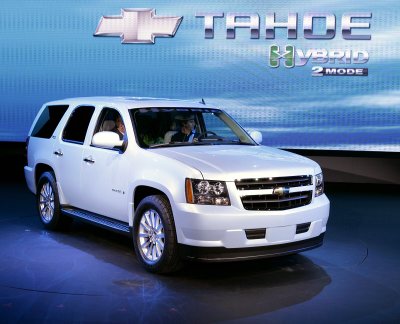morocco_mole
Member
It really pisses me off that theirs alot of european diesel cars that get insane mileage that they dont sell in america. Their much cheaper than hybrids and get better mileage.
Five Diesels from Europe that will out-eco a Prius
Posted Mar 25th 2006 10:01AM by John Neff
Filed under: Economy, Green, Audi, Kia, SMART
Your Prius may be rated at 60 mpg in the city and 51 mpg while
cruising the countryside, but chances are you’re not realizing those numbers the EPA obtained by strapping
Toyota’s Hybrid Synergy Drive to a dynamometer. In Europe, where fuel economy is calculated by actually operating
an engine on the road while it’s under the hood of a vehicle, the Prius returns a more realistic 47 mpg in the city
and 56 mpg on the highway, or 5.0L/100km city and 4.2L/100km highway in the continent’s native metric.
This more realistic fuel economy rating lowers the bar enough for a handful of European small cars to beat the Prius
in a game at which many Americans believe it’s indomitable. And guess what, these cars from the old world all use
highly fuel-efficient diesel engines.
(All mileage numbers represent official European rating converted into
miles/gallon via this conversion site)
 Audi A2
Audi A2
1.2 TDI
city: 65.33
highway: 87.11
average: 78.4
 Smart
Smart
fortwo CDI
city: 60.31
highway: 75.87
average: 69.18

Peugeot
107 Urban 1.4 HDi 54 / Citroën C1 HDi 55 SX
city: 44.38
highway: 69.18
average: 57.37)
 Citroën C2 HDi 70 SensoDrive VTR
Citroën C2 HDi 70 SensoDrive VTR
city: 48
highway: 61.9
average: 56

KIA Picanto 1.1 CRDi EX
city: 48
highway: 31.9
average: 56
If many in this country
are so concerned about eking the most amount of miles from a gallon of fuel, why hasn’t the modern diesel enjoyed
the same success here as the hybrid? The easy answer would be the ghost of diesel’s past, particularly a bad
batch of oil burners designed by Oldsmobile in
the 1980’s.
The more complicated response is that Ultra Low Sulfur Diesel fuel hasn’t been readily
available in the U.S. like it is in Europe. This special blend of diesel contains less sulfur, which reduces emissions,
but also allows for better emissions control systems to be used on a diesel engine. Fortunately ULSD will be the new
standard in the U.S. come this fall. Some companies, like DaimlerChrysler, are waiting in the wings with 50-state
approved diesels that are powerful, clean and get grand gas mileage. Will diesels finally become the eco-peer of
hybrids? Who will be the first to marry the two in an ultra-efficient diesel hybrid production car? Time will tell, but
we can all breathe easier knowing more green options are sprouting up every year.
Five Diesels from Europe that will out-eco a Prius
Posted Mar 25th 2006 10:01AM by John Neff
Filed under: Economy, Green, Audi, Kia, SMART
Your Prius may be rated at 60 mpg in the city and 51 mpg while
cruising the countryside, but chances are you’re not realizing those numbers the EPA obtained by strapping
Toyota’s Hybrid Synergy Drive to a dynamometer. In Europe, where fuel economy is calculated by actually operating
an engine on the road while it’s under the hood of a vehicle, the Prius returns a more realistic 47 mpg in the city
and 56 mpg on the highway, or 5.0L/100km city and 4.2L/100km highway in the continent’s native metric.
This more realistic fuel economy rating lowers the bar enough for a handful of European small cars to beat the Prius
in a game at which many Americans believe it’s indomitable. And guess what, these cars from the old world all use
highly fuel-efficient diesel engines.
(All mileage numbers represent official European rating converted into
miles/gallon via this conversion site)

1.2 TDI
city: 65.33
highway: 87.11
average: 78.4

fortwo CDI
city: 60.31
highway: 75.87
average: 69.18

Peugeot
107 Urban 1.4 HDi 54 / Citroën C1 HDi 55 SX
city: 44.38
highway: 69.18
average: 57.37)

city: 48
highway: 61.9
average: 56

KIA Picanto 1.1 CRDi EX
city: 48
highway: 31.9
average: 56
If many in this country
are so concerned about eking the most amount of miles from a gallon of fuel, why hasn’t the modern diesel enjoyed
the same success here as the hybrid? The easy answer would be the ghost of diesel’s past, particularly a bad
batch of oil burners designed by Oldsmobile in
the 1980’s.
The more complicated response is that Ultra Low Sulfur Diesel fuel hasn’t been readily
available in the U.S. like it is in Europe. This special blend of diesel contains less sulfur, which reduces emissions,
but also allows for better emissions control systems to be used on a diesel engine. Fortunately ULSD will be the new
standard in the U.S. come this fall. Some companies, like DaimlerChrysler, are waiting in the wings with 50-state
approved diesels that are powerful, clean and get grand gas mileage. Will diesels finally become the eco-peer of
hybrids? Who will be the first to marry the two in an ultra-efficient diesel hybrid production car? Time will tell, but
we can all breathe easier knowing more green options are sprouting up every year.








